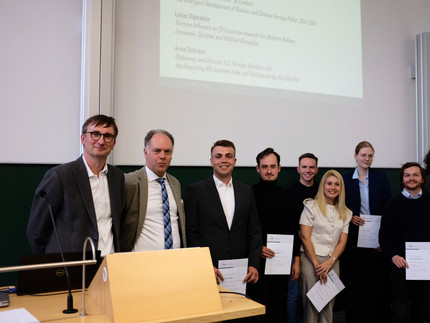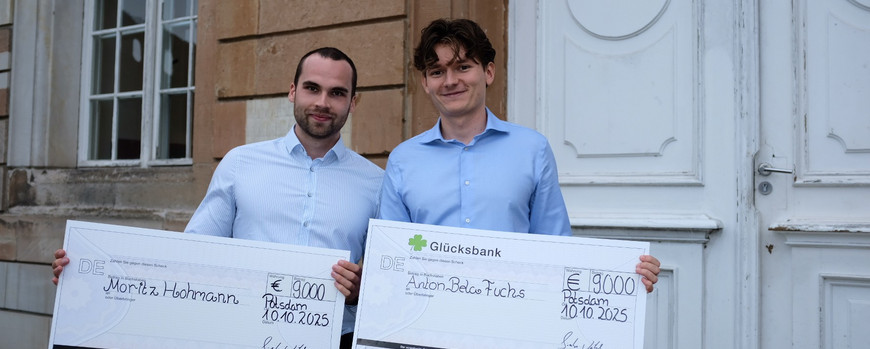Ceremonial start of the 2025 semester - Many thanks to the Friends Association
This year's ceremonial start of the semester took place on 10 October 2025. The new cohorts in the MA War and Conflict Studies and MA International War Studies programmes were welcomed.
The students from the 2023/24 cohort were bid farewell. As every year, the International War Studies class of 2024/25 joined in the tradition of embarking on the second trip of their studies, the academic year in Dublin.
Last year's graduates were also honoured. The graduates were delighted to receive their certificates, an honour they richly deserved after working hard on successful Master's theses in various subject areas.
This year, graduates Paul Behne and Raphael Nicolai from the MA War Studies programme received a special honour with the Best Prize, which is awarded each year to recognise the outstanding achievements of students. The Best Prize includes an honorary ring and prize money of €500, both of which are donated by the Friends of the Chair of Military History.
It is also thanks to the generosity of the Friends' Association that two students from the International War and Conflict Studies cohort were each awarded €9,000 this year.
This scholarship is intended to help finance the second year of study in Dublin. Anton Fuchs and Moritz Hohmann received this special honour this time, which will hopefully give them a good start in Dublin. We look forward to seeing them graduate next year.
After the award ceremony, the event came to a close in a relaxed atmosphere on the beautiful historic terrace of the university building overlooking the New Palace. Over a glass of wine or apple spritzer, the new students had the opportunity to talk to each other and make their first contacts. Of course, the exchange with graduates from previous years and other invited guests is also particularly valuable for the new cohort.
This year's semester kick-off was thus a successful start to the new winter semester 25/26.
You can find Paul Behne's Bestprize speech here.

About us
The Friends of the University of Potsdam was founded in February 2019 to support teaching and research activities in the field of military and violent history at the University of Potsdam.
A particular concern is the promotion of the English-language Master's programme International War Studies, which the University of Potsdam offers together with University College Dublin. The only bi-national course of study of its kind in the world is intended to contribute to a better understanding of the emergence and termination of military conflicts, the dynamics of violence triggered by them, and the relationship between the military and society.
The association continues to promote projects and events for the exchange of views between society, business and the humanities.
Merit Scholarship for IWS Students
The Association of Friends of the Chair of War Studies at the University of Potsdam will again generously provide up to two full tuition scholarship for students of the MA programme in International War Studies. It is worth up to 9.000 EUR and will cover the tuition fees at UCD (EU rate). The Chair of War Studies is very grateful for this opportunity and invites applications for this scholarship from the latest cohort of IWS students.
This merit scholarship is intended to support an aspiring IWS student who has demonstrated outstanding academic potential during her or his first academic year at Potsdam.
Please send your application directly to Christian E. Rieck, who will then liaise with the president of the Association of Friends. Your application should consist of a letter of motivation explaining the reasons for your application, as well as a PULS transcript of records.
Applications are open until June 27, 2025.
Good luck from all of us at the Chair of War Studies!
Vorstand
- Seit 2015 Inhaber des Lehrstuhls für Militärgeschichte an der Universität Potsdam
- Bauingenieur und Projektentwickler
- Rechtsanwalt und Generalsekretär des Volksbundes Deutscher Kriegsgräberfürsorge a.D.
- Rechtsanwalt bei der Kanzlei SKW Schwarz
Dokumente und Mitgliedschaft
- Satzung (PDF, 237 KB)
- Aufnahmeantrag (PDF, 70 KB)
- SEPA Lastschriftmandat (PDF, 205 KB)Der Jahresbeitrag beträgt 100,– €.
Spendenkonto
Badische Beamtenbank
IBAN: DE 2866 0908 0000 0704 1934
BIC: GENODE61BBB
Kontakt
Förderverein des Lehrstuhls für Militärgeschichte e.V. | Prof. Dr. Sönke Neitzel |


